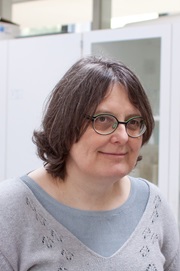Programme 23. november 2016
17:00 - 18:00 Drinks and snacks; Student poster session
18:00 - 19:00 Presentation and SPE news
19:00 - 21.00 Dinner and presentation
Particles in pores: Enemies and friends, by Associate Professor Alexander A. Shapiro, DTU
 Fine particles naturally appear in the rocks of the petroleum reservoirs. They may be released when the brine of a modified salinity is injected in order to produce oil. The fines or bacteria are also contained in the injected brine, causing the the injectivity decline and possible formation damage. How deeply can particles penetrate? How are they released? How do they plug the pores? The recent research gives a new insight on these questions.
Fine particles naturally appear in the rocks of the petroleum reservoirs. They may be released when the brine of a modified salinity is injected in order to produce oil. The fines or bacteria are also contained in the injected brine, causing the the injectivity decline and possible formation damage. How deeply can particles penetrate? How are they released? How do they plug the pores? The recent research gives a new insight on these questions.
Alexander A. Shapiro is Associate Professor at CERE – Center for Energy Resources Engineering, Department of Chemical and Biochemical Engineering, DTU. He is Head of studies for the Master program in petroleum engineering at the DTU. The research interests of A. Shapiro are related to fluids and particles in porous media, with application to the problems of petroleum and chemical engineering, where he has published several ten per-reviewed papers and supervised 20 Ph.D. students.
Mineral precipitation from brines, by Associate Professor Kaj Thomsen, DTU
 ABSTRACT: Pressure changes, temperature changes, and mixing of incompatible brines can cause mineral precipitation in oil fields and production equipment. If brine compositions, temperature, and pressures are known, the potential for mineral precipitation (scale formation) can be calculated. Mineral precipitation should not always be considered a problem, but might sometimes contribute to increasing the recovery factor.
ABSTRACT: Pressure changes, temperature changes, and mixing of incompatible brines can cause mineral precipitation in oil fields and production equipment. If brine compositions, temperature, and pressures are known, the potential for mineral precipitation (scale formation) can be calculated. Mineral precipitation should not always be considered a problem, but might sometimes contribute to increasing the recovery factor.
Kaj Thomsen is Associate Professor at CERE – Center for Energy Resources Engineering, Department of Chemical and Biochemical Engineering, DTU. He holds M.Sc. and Ph.D. degrees in chemical engineering from DTU. Kaj Thomsen is an expert in thermodynamics of electrolytes, including the problems of corrosion, freezing/melting of the water solutions, as well as mineral and salt precipitation. He has published many research papers on the subject and has been a main supervisor for 10 Ph.D. students.
What makes chalk stick together, by Professor Ida Fabricius, DTU

Chalk will typically leave your fingers white, if you touch it, so is it just a more or less densily packed sediment, or is it a cemented sedimentary rock? What is the role of friction and cohesion?
The answer is relevant for example to the discussion of how pore-fluids influence the stiffness and strength of the chalk.
Ida L. Fabricius is Professor at CERE – Center for Energy Resources Engineering, DTU Civil Engineering, where she is coordinator of the Geophysics Research Group. She holds a B.Sc. in chemistry, M.Sc. in geology, as well as Ph.D. and Dr. of Science degrees in technical geology. She joined DTU in 1985, after a few years as development geologist at Mærsk Oil and Gas AS. She has published several ten per-reviewed articles and has been the primary supervisor of 20 Ph.D. students.
Dinner talk: Erling H. Stenby
My Experience in Enhanced Oil Recovery Research: A Third of a Century Retold in a Third of an Hour
 This talk is a quick tour of the EOR research at DTU. Starting with the first naïve steps leading through years of growing research activities in CERE with Danish and international partners. Going through cycles in the oil price, changing political agendas, and progress in science leading to the current situation.
This talk is a quick tour of the EOR research at DTU. Starting with the first naïve steps leading through years of growing research activities in CERE with Danish and international partners. Going through cycles in the oil price, changing political agendas, and progress in science leading to the current situation.
Professor Erling H. Stenby is the Head of the Chemistry Department at the DTU, and the Scientific Director at the Center for Oil and Gas (DHRTC). He was a Director for CERE during twenty years (from 1994). He has an experience in research management of the large projects related to petroleum production, and a long experience in the research in enhanced oil recovery. E.H. Stenby been the Danish representative in the collaborative program on enhanced oil recovery organized by the International Energy Agency.
Venue
DTU – Technical University of Denmark, b. 101, aud, 1 (main building, main entrance)
2800 Kgs. Lyngby